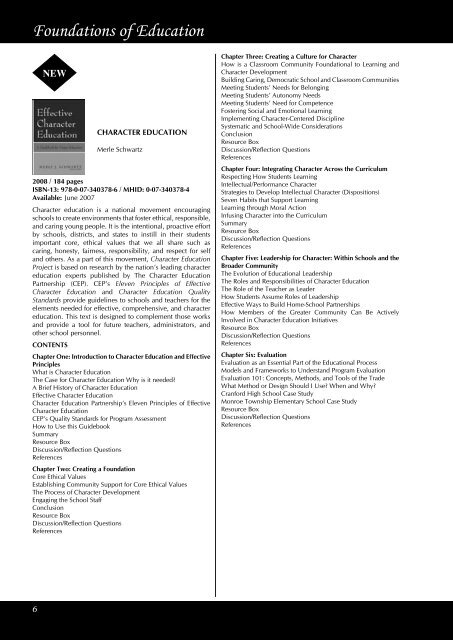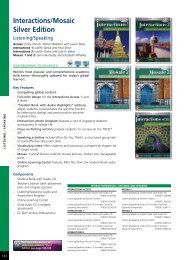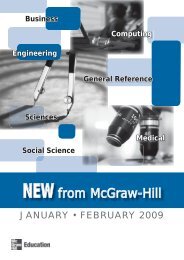table of contents - McGraw-Hill Books
table of contents - McGraw-Hill Books
table of contents - McGraw-Hill Books
You also want an ePaper? Increase the reach of your titles
YUMPU automatically turns print PDFs into web optimized ePapers that Google loves.
Foundations <strong>of</strong> Education<br />
NEW<br />
CHARACTER EDUCATION<br />
Merle Schwartz<br />
2008 / 184 pages<br />
ISBN-13: 978-0-07-340378-6 / MHID: 0-07-340378-4<br />
Available: June 2007<br />
Character education is a national movement encouraging<br />
schools to create environments that foster ethical, responsible,<br />
and caring young people. It is the intentional, proactive effort<br />
by schools, districts, and states to instill in their students<br />
important core, ethical values that we all share such as<br />
caring, honesty, fairness, responsibility, and respect for self<br />
and others. As a part <strong>of</strong> this movement, Character Education<br />
Project is based on research by the nation’s leading character<br />
education experts published by The Character Education<br />
Partnership (CEP). CEP’s Eleven Principles <strong>of</strong> Effective<br />
Character Education and Character Education Quality<br />
Standards provide guidelines to schools and teachers for the<br />
elements needed for effective, comprehensive, and character<br />
education. This text is designed to complement those works<br />
and provide a tool for future teachers, administrators, and<br />
other school personnel.<br />
CONTENTS<br />
Chapter One: Introduction to Character Education and Effective<br />
Principles<br />
What is Character Education<br />
The Case for Character Education Why is it needed?<br />
A Brief History <strong>of</strong> Character Education<br />
Effective Character Education<br />
Character Education Partnership’s Eleven Principles <strong>of</strong> Effective<br />
Character Education<br />
CEP’s Quality Standards for Program Assessment<br />
How to Use this Guidebook<br />
Summary<br />
Resource Box<br />
Discussion/Reflection Questions<br />
References<br />
Chapter Two: Creating a Foundation<br />
Core Ethical Values<br />
Establishing Community Support for Core Ethical Values<br />
The Process <strong>of</strong> Character Development<br />
Engaging the School Staff<br />
Conclusion<br />
Resource Box<br />
Discussion/Reflection Questions<br />
References<br />
Chapter Three: Creating a Culture for Character<br />
How is a Classroom Community Foundational to Learning and<br />
Character Development<br />
Building Caring, Democratic School and Classroom Communities<br />
Meeting Students’ Needs for Belonging<br />
Meeting Students’ Autonomy Needs<br />
Meeting Students’ Need for Competence<br />
Fostering Social and Emotional Learning<br />
Implementing Character-Centered Discipline<br />
Systematic and School-Wide Considerations<br />
Conclusion<br />
Resource Box<br />
Discussion/Reflection Questions<br />
References<br />
Chapter Four: Integrating Character Across the Curriculum<br />
Respecting How Students Learning<br />
Intellectual/Performance Character<br />
Strategies to Develop Intellectual Character (Dispositions)<br />
Seven Habits that Support Learning<br />
Learning through Moral Action<br />
Infusing Character into the Curriculum<br />
Summary<br />
Resource Box<br />
Discussion/Reflection Questions<br />
References<br />
Chapter Five: Leadership for Character: Within Schools and the<br />
Broader Community<br />
The Evolution <strong>of</strong> Educational Leadership<br />
The Roles and Responsibilities <strong>of</strong> Character Education<br />
The Role <strong>of</strong> the Teacher as Leader<br />
How Students Assume Roles <strong>of</strong> Leadership<br />
Effective Ways to Build Home-School Partnerships<br />
How Members <strong>of</strong> the Greater Community Can Be Actively<br />
Involved in Character Education Initiatives<br />
Resource Box<br />
Discussion/Reflection Questions<br />
References<br />
Chapter Six: Evaluation<br />
Evaluation as an Essential Part <strong>of</strong> the Educational Process<br />
Models and Frameworks to Understand Program Evaluation<br />
Evaluation 101: Concepts, Methods, and Tools <strong>of</strong> the Trade<br />
What Method or Design Should I Use? When and Why?<br />
Cranford High School Case Study<br />
Monroe Township Elementary School Case Study<br />
Resource Box<br />
Discussion/Reflection Questions<br />
References<br />
6

















